Springtime on the homestead means more daylight, and happier chickens. Happier chickens make more eggs, and thus, we have an overabundance to deal with. In order to have plenty in the fall and winter months, water glassing eggs is the perfect solution.
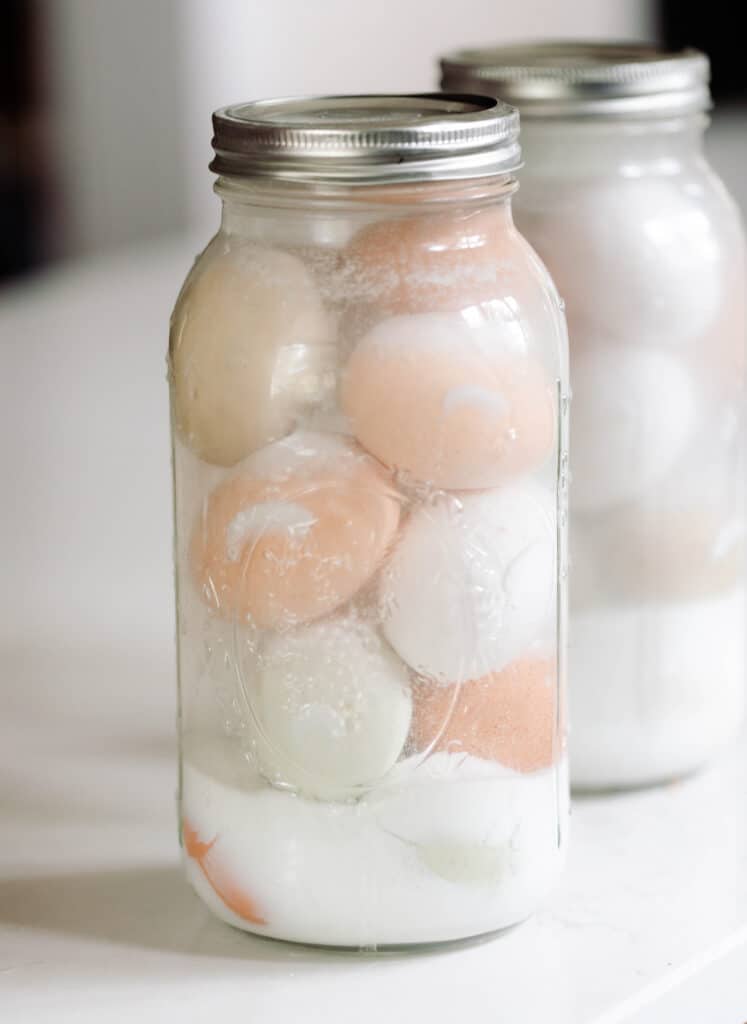
What is Water glassing Eggs?
Water glassing eggs involves submerging clean, unwashed, eggs in a pickling lime and water solution to seal off the shell and preserve them for 12-18 months. The result is perfectly fresh, unspoiled eggs, just like they were the day the hen laid them. Sometimes properly water glassed eggs are still fresh even after two years. Homestead folks have been using this preservation method since the 1800s to capitalize on the springtime egg abundance year round.
There are a few different solutions that work for water glassing, such as sodium silicate and water, but today I am going to share a method for using hydrated lime, which is also known as pickling lime.
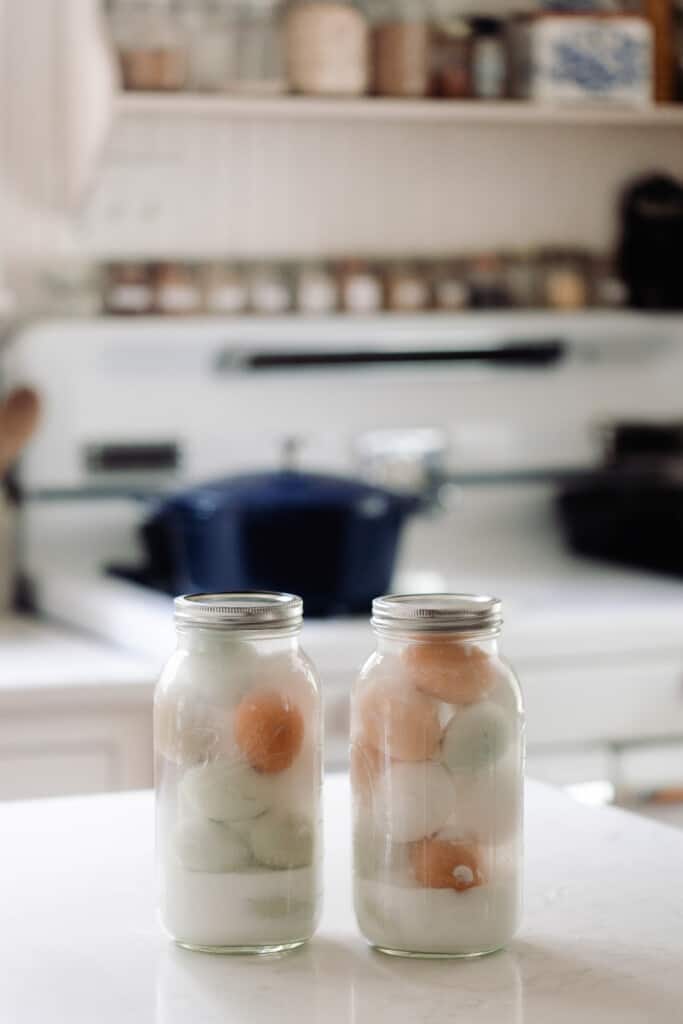
Tips:
You can fit approximately 16-18 eggs per half gallon jar.
Use your cleanest eggs for water glassing. I usually set aside the spotless ones and wait to water glass until I have enough of them. We wash the really dirty ones and store them in the refrigerator. If we keep up with cleaning the coop, and adding fresh straw or bedding, we have a lot more water glass candidates.
If you don’t have a water filter, and you only have access to chlorinated water, you can leave an open jar of water out on the counter for 24 hours. This will cause the chlorine to evaporate.
Use an airtight vessel. Oxygen is the enemy of nearly all food preservation methods, and water glassing is no exception!
Use 1 ounce of pickling lime per quart of water. You can do this in any quantity. So if you have 50 dozen eggs, get yourself some big old food grade buckets and whole lot of lime!
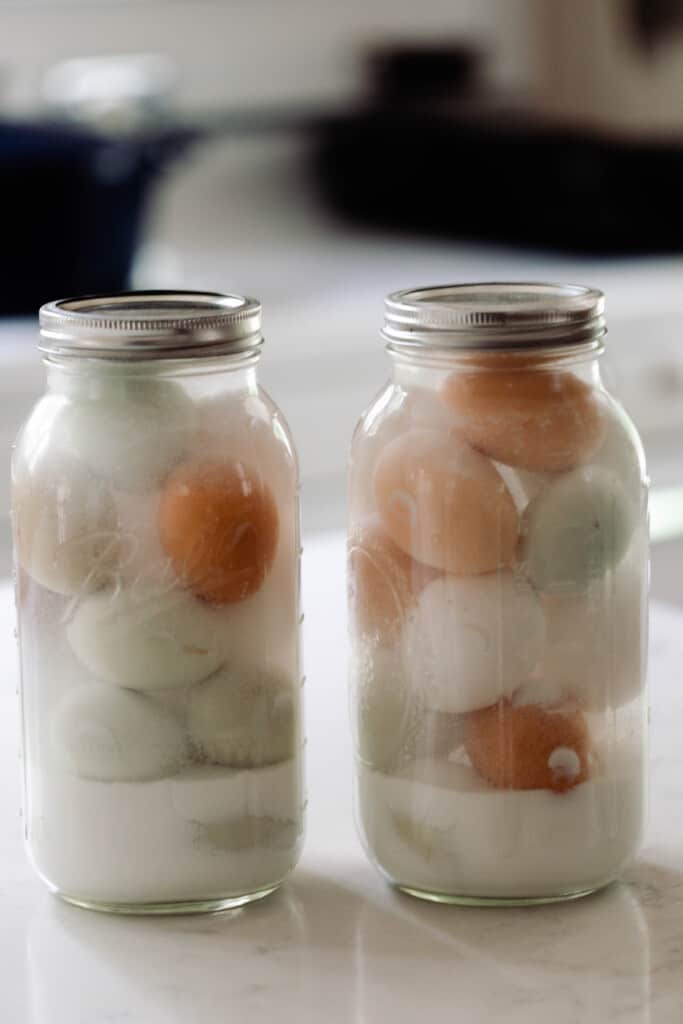
FAQ
Why should you preserve eggs?
We don’t usually think of eggs as a seasonal food, but they actually are. A hen’s ovulation coincides with the length of the day. In the winter, when the daylight hours are short, hens lay little to no eggs. Chickens reach their peak egg laying production when the daylight hours are longest. Heat can also affect ovulation, so springtime, between April and June, yields the highest egg volume here on our homestead. In order to avoid buying several dozen eggs a week in the middle of winter, it makes sense to preserve them when production is up.
Can you water glass store bought eggs?
Unfortunately, no, you cannot water glass store bought eggs. When hens lay eggs, they are covered with a protective “bloom” to keep the eggs fresher longer. This is the reason you can find a pile of eggs hidden somewhere on your homestead after a few weeks, and they are still perfectly fresh and edible. Eggs from the grocery store have been thoroughly cleaned and sanitized, so the bloom is no longer in tact. The lime solution in water glassing works with the bloom to preserve the eggs, so sanitized eggs are a definitee no-go for this method. Try freezing the eggs instead.
Can you use tap water to water glass eggs?
Avoid chlorinated and fluorinated water when water glassing eggs. Ideally you would have access to filtered water that still has all of the minerals intact. If you are on a well, tap water will work just fine. If you are on city water with chlorine and fluoride, opt for a filter, such as the Berkey Water Filter for water glassing eggs.
Can you boil water glass eggs?
You can hard boil eggs that have been water glassed, but it is important to note that you should first poke a small hole in the shell. The hydrated lime solution works by sealing off the egg, and filling all of the pores of the eggshell, so it could actually explode if you don’t first create a release for the pressure.
What is hydrated lime?
Hydrated lime aka calcium hydroxide is a dry and colorless white powder that is most commonly used in steel manufacturing. It is also known as pickling lime or slaked lime.
Can I use garden lime for water glassing eggs?
Garden lime is calcium carbonate, whereas pickling lime is calcium hydroxide. Since the hydroxide is more alkaline, pickling lime is recommended for water glassing.
Is it normal for the lime to settle on the bottom?
Yes, settling lime is a normal part of the process. You may be tempted to stir the solution back up, but don’t do it! You risk cracking the eggs and ruining the whole batch. There is still plenty of lime in the water to preserve the eggs, so no need to worry.
Are water glassed eggs safe to eat?
As long as the process was done properly, water glassed eggs are perfectly safe. Make sure to use clean jars and utensils and clean unwashed eggs. If an egg has gone bad, you will know. The smell will be way off. You can also use the float test to ensure the egg is still fresh.
Do they taste different than fresh eggs?
No! That is the best part about water glassed eggs. Freezing and dehydrating eggs changes the texture of the eggs, whereas water glassing keeps them exactly as they were the day the hen laid them.
When can I preserve farm fresh eggs?
Do you have an overabundance of eggs in the winter for some reason? No worries! You can use water glassing anytime. The eggs also don’t need to be harvested fresh that day. You can wait until you have enough clean ones saved up and do a big preserving day anytime!
Ingredients you will need:
1 ounce pickling lime
1 quart filtered water
Clean unwashed eggs (Eggs that have no poop or mud, and the “bloom” still fully intact)
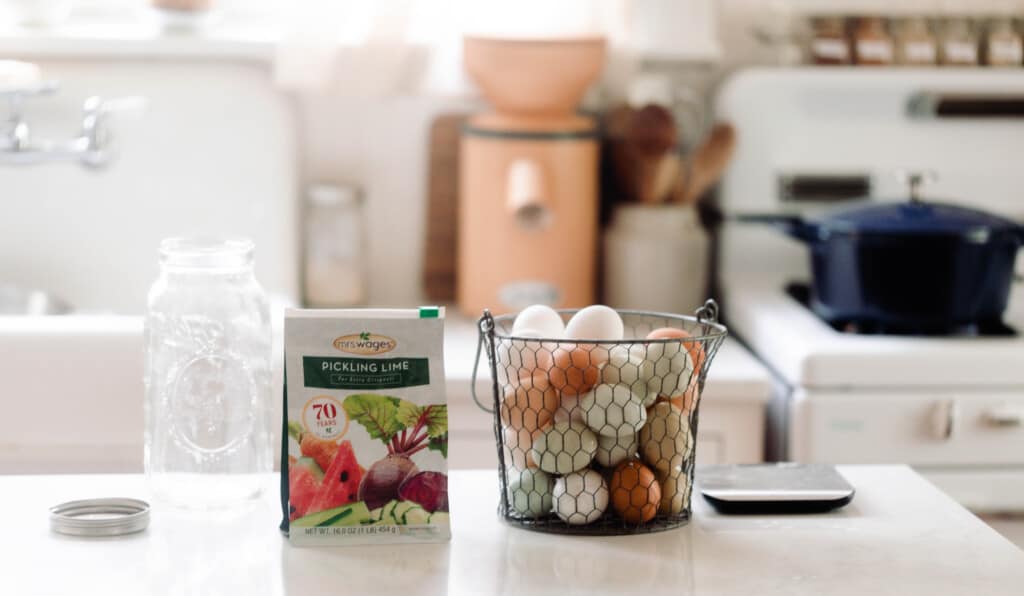
Equipment:
Airtight Food grade bucket or half gallon glass jar
Kitchen scale (to weigh the pickling lime)
What types of eggs can you use:
Chicken Eggs
Quail Eggs
Duck Eggs
Any eggs can we water glassed!
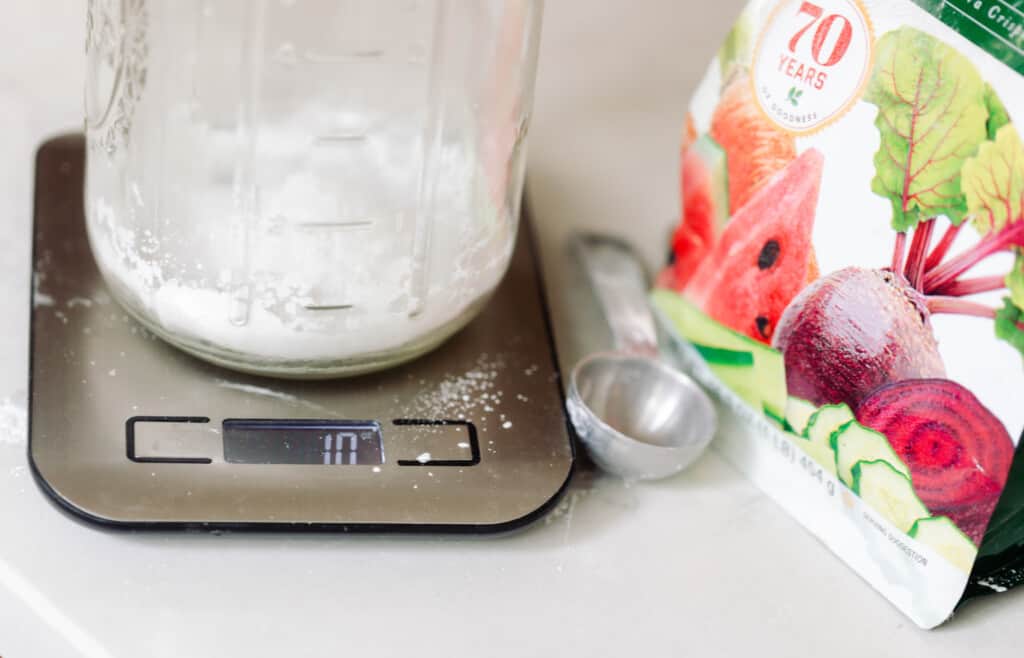
How To Water Glass Eggs:
Measure out 1 ounce of pickling lime on your kitchen scale.
Add the pickling lime to a clean half gallon jar and fill it up halfway (one quart) with filtered water.
Whisk the lime into the water until it is fully incorporated.
Carefully add the eggs pointy side down.
Add an airtight lid to prevent oxygen from getting in, and prevent the water from evaporating.
Store the water glassed eggs in a cool dark place.
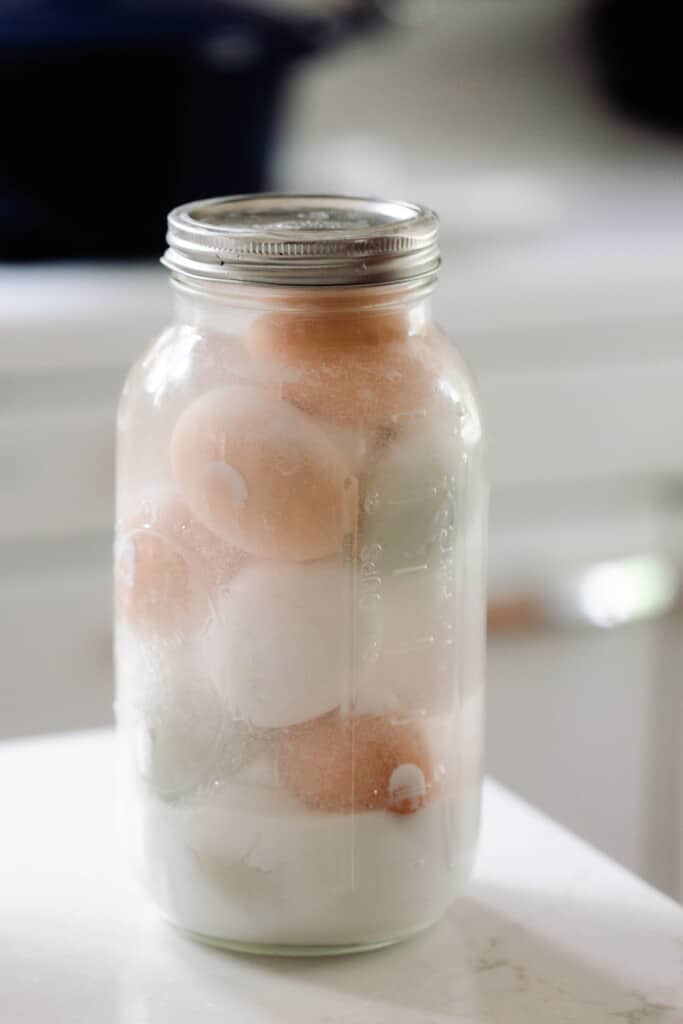
How Long Do They Last?
You can store water glassed eggs in a cool dark place for up to a year. Some people have had success for much longer.
Water Glassing Eggs
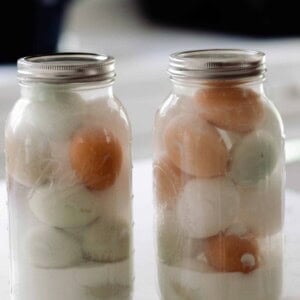
Ingredients
- 1 ounce pickling lime
- 1 quart filtered water
- Clean unwashed eggs, Eggs that have no poop or mud, and the “bloom” still fully intact
Instructions
- Measure out 1 ounce of pickling lime on your kitchen scale.
- Add the pickling lime to a clean half gallon jar and fill it up halfway (one quart) with filtered water.
- Whisk the lime into the water until it was fully incorporated.
- Carefully add the eggs pointy side down.
- Add an airtight lid to prevent oxygen from getting in, and prevent the water from evaporating.
- Store the water glassed eggs in a cool dark place.
Notes
- You can store water glassed eggs in a cool dark place for up to a year. Some people have had success for much longer.
Nutrition
Nutrition information is automatically calculated, so should only be used as an approximation.
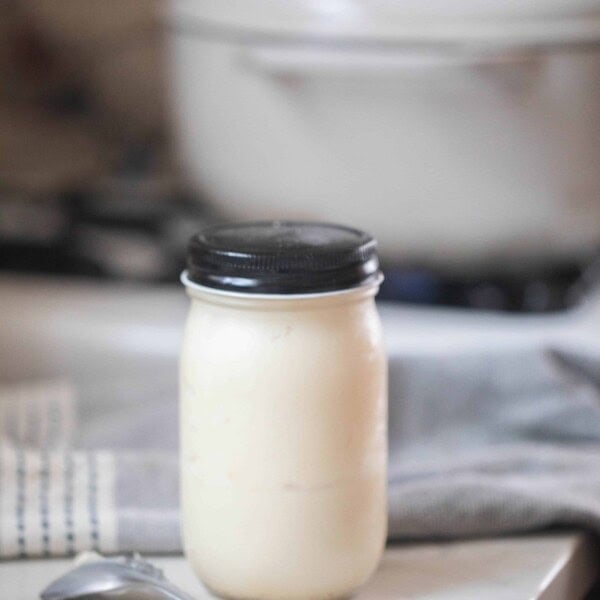
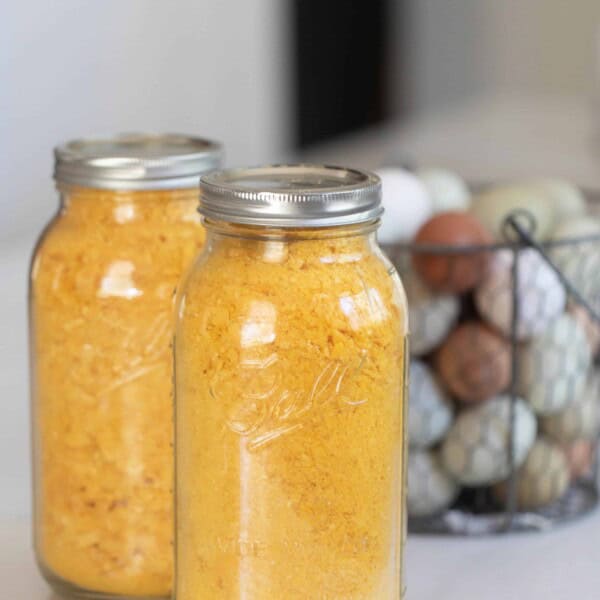
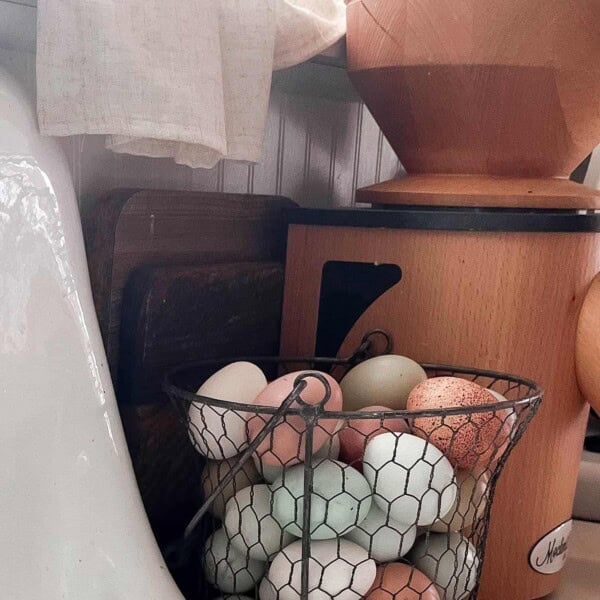
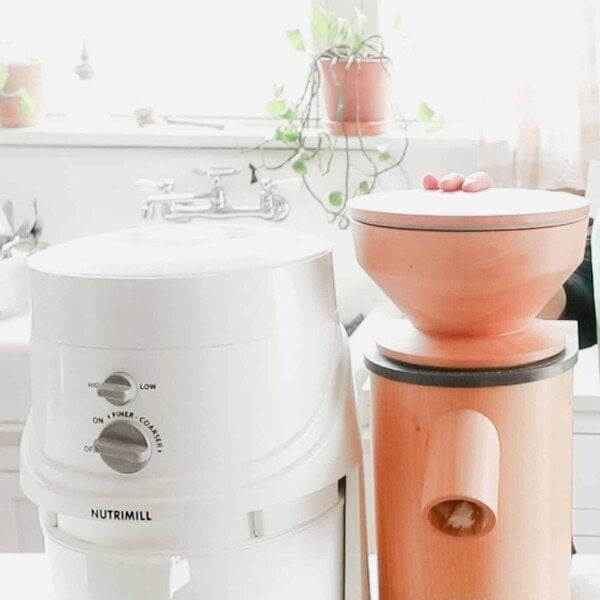






What a very interesting article about glassing eggs. I am 73 now and have never heard of it. My dads dad was a sharecropper in Alabama and I would bet they did this sort of thing.
I bet they had no electricity at all.
I have a silly question. In your experience doing this, does it matter if the eggs aren’t pointy side down? My eggs keep going sideways. I’m finally trying this after years of hearing about it. The foxes got my hens last year just as I had gathered everything and they were laying so well. Hoping to save a bunch with my new girls who are very prolific right now. Thanks!
It should be fine! It is hard to get them all pointy side down.
I’m trying this today. Thank you.
When you open the jar after say a year … can you just get a couple out and resclose the jar or do they now have to be refrigerated?
Also is there a big risk for botulism?
If I am going to get eggs out, I like to get more than just a few out. Usually a dozen and then I will put those in the refrigerator. You want to minimize the risk for introducing any bacteria into the water.
How long do they last in the fridge after glassing?
A month or so!
I’m wondering if you can add new eggs to the jar? I have a gallon jar, and thought I would add to it but just saw in the comments you don’t recommend. Thinking I’ll take them out since it’s been three minutes… and wait til I have more eggs.
I would wait until you have more eggs! The issue with adding more is that you’re always introducing new bacteria to the jar and it’s best to minimize that.
Can I use a 1 gallon pickle jar? It is not a ‘mason jar’. Will thatmwork? I have order pickling lime.
Yes, as long as it is washed really well it should be fine!
Can you water glass eggs that have been refrigerated even though not cleaned?
No, I would not.
Why is that? I put my eggs in the fridge. 🤨
The condensation could effect the bloom making it no longer safe to water glass.
I put a couple of eggs that still had some poop on them..what will that do to my lime?
Well it could introduce bacteria to your other eggs. It’s best to wipe them off, so they are clean going in.
Yay for water glassing! I did this recipe with a 64 Oz jar and about 12 eggs so far, super messy with overflow spilling out even with filling only 32 Oz of water, so next time I’ll put the eggs in first then add the water mixture in the jar hahaha. Fingers crossed for a good batch!! Is it true we can add eggs to the jar even afterwards? Thanks for this!!
Hi, once a jar or waterglasses eggs is open, is it OK to remove some eggs and just replace the lid? Assuming the jar stays in the cold room…
Yes, that’s fine. I would just not add any new eggs.
This is a wonderful method! What do you do with the lime water after the jar is empty?
I usually just throw it out.
Recently, I read that you can use the solution to clean (not disinfect) around the house. Apparently, people used to do this. If anyone can confirm or deny this, that would be helpful.
Thanks for the info! Can’t seem to find the answer to the following question anywhere and hope you can help.. (even if just to say “I do it this way”… that’s good enough for me:)
I normally crush up my eggshells and feed them back to my hens. Are water-glassed eggshells safe for them to consume? Thanks in advance!
That’s a great question! I haven’t personally tried it after taking them out of the lime water.